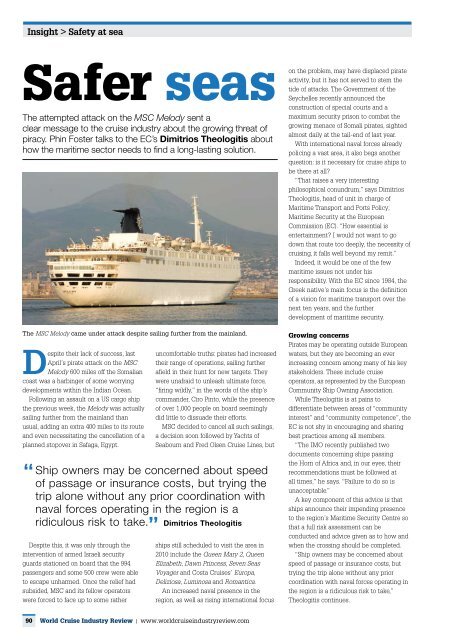Metamorphosis - Cruise Ship Portal
Metamorphosis - Cruise Ship Portal
Metamorphosis - Cruise Ship Portal
You also want an ePaper? Increase the reach of your titles
YUMPU automatically turns print PDFs into web optimized ePapers that Google loves.
Insight > Safety at sea<br />
Safer seas<br />
The attempted attack on the MSC Melody sent a<br />
clear message to the cruise industry about the growing threat of<br />
piracy. Phin Foster talks to the EC’s Dimitrios Theologitis about<br />
how the maritime sector needs to find a long-lasting solution.<br />
The MSC Melody came under attack despite sailing further from the mainland.<br />
Despite their lack of success, last<br />
April’s pirate attack on the MSC<br />
Melody 600 miles off the Somalian<br />
coast was a harbinger of some worrying<br />
developments within the Indian Ocean.<br />
Following an assault on a US cargo ship<br />
the previous week, the Melody was actually<br />
sailing further from the mainland than<br />
usual, adding an extra 400 miles to its route<br />
and even necessitating the cancellation of a<br />
planned stopover in Safaga, Egypt.<br />
“<br />
Despite this, it was only through the<br />
intervention of armed Israeli security<br />
guards stationed on board that the 994<br />
passengers and some 500 crew were able<br />
to escape unharmed. Once the relief had<br />
subsided, MSC and its fellow operators<br />
were forced to face up to some rather<br />
90<br />
uncomfortable truths: pirates had increased<br />
their range of operations, sailing further<br />
afield in their hunt for new targets. They<br />
were unafraid to unleash ultimate force,<br />
“firing wildly,” in the words of the ship’s<br />
commander, Ciro Pinto, while the presence<br />
of over 1,000 people on board seemingly<br />
did little to dissuade their efforts.<br />
MSC decided to cancel all such sailings,<br />
a decision soon followed by Yachts of<br />
Seabourn and Fred Olsen <strong>Cruise</strong> Lines, but<br />
<strong>Ship</strong> owners may be concerned about speed<br />
of passage or insurance costs, but trying the<br />
trip alone without any prior coordination with<br />
naval forces operating in the region is a<br />
ridiculous risk to take. Dimitrios Theologitis<br />
ships still scheduled to visit the area in<br />
2010 include the Queen Mary 2, Queen<br />
Elizabeth, Dawn Princess, Seven Seas<br />
Voyager and Costa <strong>Cruise</strong>s’ Europa,<br />
Deliziosa, Luminosa and Romantica.<br />
An increased naval presence in the<br />
region, as well as rising international focus<br />
World <strong>Cruise</strong> Industry Review | www.worldcruiseindustryreview.com<br />
on the problem, may have displaced pirate<br />
activity, but it has not served to stem the<br />
tide of attacks. The Government of the<br />
Seychelles recently announced the<br />
construction of special courts and a<br />
maximum security prison to combat the<br />
growing menace of Somali pirates, sighted<br />
almost daily at the tail-end of last year.<br />
With international naval forces already<br />
policing a vast area, it also begs another<br />
question: is it necessary for cruise ships to<br />
be there at all?<br />
“That raises a very interesting<br />
philosophical conundrum,” says Dimitrios<br />
Theologitis, head of unit in charge of<br />
Maritime Transport and Ports Policy;<br />
Maritime Security at the European<br />
Commission (EC). “How essential is<br />
entertainment? I would not want to go<br />
down that route too deeply, the necessity of<br />
cruising, it falls well beyond my remit.”<br />
Indeed, it would be one of the few<br />
maritime issues not under his<br />
responsibility. With the EC since 1984, the<br />
Greek native’s main focus is the definition<br />
of a vision for maritime transport over the<br />
next ten years, and the further<br />
development of maritime security.<br />
Growing concerns<br />
Pirates may be operating outside European<br />
waters, but they are becoming an ever<br />
increasing concern among many of his key<br />
stakeholders. These include cruise<br />
operators, as represented by the European<br />
Community <strong>Ship</strong> Owning Association.<br />
While Theologitis is at pains to<br />
differentiate between areas of “community<br />
interest” and “community competence”, the<br />
EC is not shy in encouraging and sharing<br />
best practices among all members.<br />
“The IMO recently published two<br />
documents concerning ships passing<br />
the Horn of Africa and, in our eyes, their<br />
recommendations must be followed at<br />
all times,” he says. “Failure to do so is<br />
unacceptable.”<br />
A key component of this advice is that<br />
ships announce their impending presence<br />
to the region’s Maritime Security Centre so<br />
that a full risk assessment can be<br />
conducted and advice given as to how and<br />
when the crossing should be completed.<br />
“<strong>Ship</strong> owners may be concerned about<br />
speed of passage or insurance costs, but<br />
trying the trip alone without any prior<br />
coordination with naval forces operating in<br />
the region is a ridiculous risk to take,”<br />
Theologitis continues.


